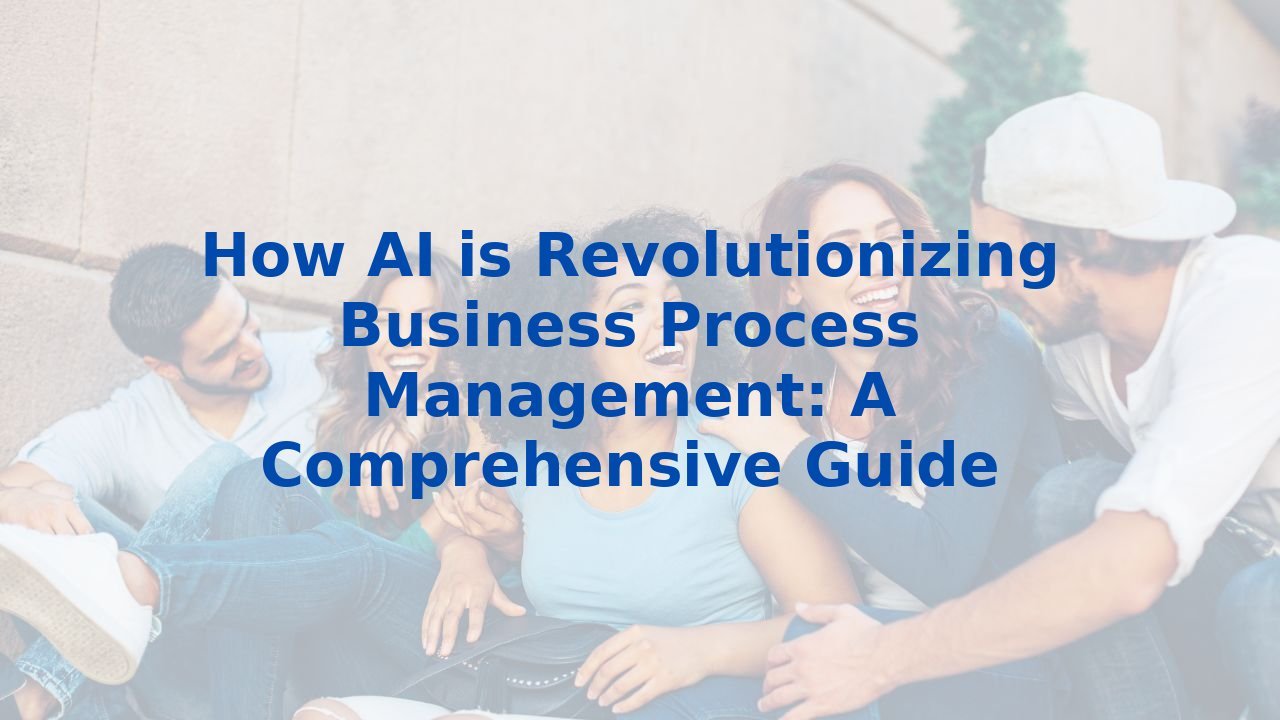How AI is Revolutionizing Business Process Management: A Comprehensive Guide
How AI is Revolutionizing Business Process Management: A Comprehensive Guide
Introduction
In today's rapidly evolving business landscape, organizations are relentlessly pursuing methods to elevate operational efficiency and streamline their fundamental processes. One of the most transformative advancements driving this change is the integration of Artificial Intelligence (AI) into Business Process Management (BPM). This post explores how AI enhances various business processes and the myriad benefits it brings to organizational efficiency.
Understanding Business Process Management
Business Process Management is a strategic approach that focuses on optimizing and managing business processes. It encompasses the analysis, design, execution, and monitoring of processes to achieve specific objectives. Historically, BPM leaned heavily on manual inputs and human decision-making—approaches that often led to inefficiencies and errors.
How AI Enhances Business Processes
AI is revolutionizing BPM by automating, analyzing, and optimizing processes in unprecedented ways. Let's delve into some key areas where AI can make a significant impact:
1. Data Analysis and Insights
AI possesses the ability to rapidly process and analyze vast amounts of data, unveiling intricate trends, predicting outcomes, and identifying underlying issues. This swift data analysis empowers businesses to make informed tactical and strategic decisions, propelling them ahead of the competition.
2. Process Building and Automation
AI streamlines the creation of new workflows and processes by utilizing user-defined parameters. This capability significantly reduces the time and effort required for process mapping. Furthermore, with AI automating routine tasks, human resources can be repurposed to focus on strategic initiatives that drive business growth.
3. Process Optimization
AI enhances process simulation by examining historical data and recognizing patterns essential for constructing simulation models. This empowers organizations to accurately calculate key performance indicators (KPIs), pinpoint bottlenecks, and forecast the impact of potential process changes before implementation.
4. Real-Time Monitoring and Decision-Making
With AI, businesses gain the ability to monitor processes in real-time, providing up-to-the-minute insights regarding process status. This facilitates immediate intervention, solving problems or capitalizing on emerging opportunities as they arise.
5. Customer Service and Sales
AI elevates customer service by automating basic inquiries and evaluating customer feedback, ultimately highlighting areas for improvement. In the realm of sales, AI recommends effective sales channels, uncovers upsell opportunities, and prioritizes leads based on predictive analysis.
6. Human Resources
AI enhances the capabilities of HR teams by increasing objectivity and improving the employee experience. It facilitates the consolidation of data for making competitive salary offers, streamlines recruitment processes, and even personalizes career development paths for employees.
Benefits of AI for Improving Efficiency
The infusion of AI into BPM creates a ripple effect of advantages for organizational efficiency:
- Reduced Errors: Automation minimizes the potential for human error, resulting in more reliable processes.
- Increased Productivity: By relieving human resources of mundane tasks, employees are liberated to focus on strategic activities that contribute to business growth.
- Enhanced Decision-Making: AI equips organizations with data-driven insights, enabling better, more informed decisions rooted in comprehensive real-time analysis.
- Improved Customer Experience: AI-powered solutions enhance customer interactions by delivering swift and precise responses to inquiries.
- Cost Savings: Through the automation of routine tasks, AI significantly curtails operational costs while improving return on investment (ROI).
The Importance of Training Employees for AI
While AI serves as a powerful tool for enhancing business processes, it is imperative to equip employees with the knowledge and skills to utilize these systems effectively:
- Understanding AI Capabilities: Employees must comprehend how AI functions and its potential to maximize operational benefits.
- Integration with Human Skills: AI complements human skills rather than replacing them. Training facilitates a seamless collaboration between technology and people.
- Adaptability: As AI technology evolves, so too must the workforce. Continuous training ensures that employees remain agile and able to learn new skills swiftly.
- Ethical Considerations: Training also encompasses understanding the ethical implications of AI, including data privacy and mitigating bias.
Conclusion
The integration of AI into BPM is redefining how organizations manage their processes. By automating, analyzing, and optimizing workflows, AI enhances efficiency, reduces errors, and elevates decision-making. However, harnessing the full power of AI requires a dedicated effort to train employees effectively. By merging the capabilities of AI with the skills and adaptability of human teams, businesses can achieve remarkable improvements in operational efficiency, ensuring they thrive in an increasingly competitive environment.



